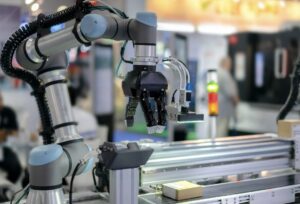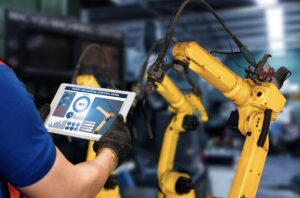Recent Trends in Manufacturing Technology
Revolutionizing the sector, recent trends in manufacturing technology embrace cutting-edge advancements such as Automation and Robotics, 3D Printing, and the rise of Industry 4.0. They’re an integral part of the shift towards smarter, more sustainable production processes that not only transform how products are manufactured, but also mold the industry’s future.
Automation and Robotics

Automation and robotics, an essential trend in manufacturing technology, represent a significant shift in the industry.
As more tasks become automated and robots become increasingly sophisticated, they’re revolutionizing traditional manufacturing processes.
From welding and painting to assembly and quality control, automation and robotics provide swift, accurate results, decreasing human error and labor costs while enhancing productivity and efficiency.
3D Printing Advancements
Another prominent trend, 3D printing advancements, have dramatically transformed the landscape of manufacturing. Originally designed for prototyping, 3D printers now manufacture intricate, high-quality parts for a range of industries. Companies leverage this technology for small-scale, customized production. It offers enormous potential for waste reduction and increased efficiency. A notable example is the aerospace industry where 3D-printed fuel nozzles and other parts demonstrate improved performance and significant material savings.
The Rise of Industry 4.0
The surge of Industry 4.0, often described as the Fourth Industrial Revolution, is another transformative trend in manufacturing technology. It comprises interconnected systems that communicate, analyze, and use information to drive smart decisions.

Core elements of Industry 4.0 include the Internet of Things (IoT), machine-to-machine communication, artificial intelligence, and data analytics.
An instance of its application can be seen in predictive maintenance, where machines alert operators about potential faults and breakdowns, improving efficiency and reducing downtime.
The rise of Industry 4.0 fuels a more interconnected and intelligent manufacturing landscape, designed for optimum productivity and sustainability.
Impact of AI on Manufacturing Processes
Transcending the fields of IoT and digitized systems, Artificial Intelligence’s (AI) imprint on manufacturing processes aligns with the principles of Industry 4.0, amplifying the efficiencies and reimagining the productivity frameworks.
AI in Quality Control
AI revolutionizes quality control by predicting flaws before they even manifest. Deployments of AI, like Machine Learning and Computer Vision systems, scrutinize raw materials thoroughly, identify microscopic defects typical human inspections might miss. For instance, IBM’s AI-powered visual inspection system boosts defect detection rates up to almost 90%, significantly reducing waste and avoidable costs.
Smart Manufacturing
AI’s influence extends to promoting smart manufacturing – a concept closely knitted with Industry 4.0. Empowered by AI, manufacturing turns into an intelligent system with self-optimization capabilities, predictive maintenance, and adaptive scheduling.

For example, Siemens’ MindSphere – an AI-driven system, optimizes operations, reduces unexpected downtime, and saves crucial resources, demonstrating smart manufacturing’s potential.
Utilizing AI algorithms, machines ‘communicate’ with each other, making production smoother while AI character helps significantly minimize risks.
AI-enabled sensors predict maintenance requirements, allowing for ‘proactive’ rather than ‘reactive’ measures, exemplified by companies like PTC who implement AI in their industrial IoT platforms.
Sustainable Practices in Modern Manufacturing
Embedding sustainability at the heart of manufacturing enterprises, industry leaders gravitate towards lower energy consumption, waste minimization, and the efficient utilization of resources. With advancements in manufacturing technology such as AI and machine learning, businesses are more capable than ever to implement and benefit from sustainable practices.
Energy Efficiency
Energy-efficient practices stand at the helm of modern manufacturing. Hybrid manufacturing combines additive manufacturing, such as 3D printing, with subtractive processes to diminish energy use. Manufacturers look for ways to optimize, refine, and recycle energy, tapping into various technology innovations like energy management systems. An instance of this technology in action is the usage of Schneider Electric’s energy management software, EcoStruxure, which assists manufacturers in realizing energy-related cost savings.
Recycling and Reuse in the Industry
Recycling and reuse in the manufacturing industry are paramount to transitioning toward a circular economy. Many manufacturers have integrated recycling processes into their operations, reducing waste production and fostering conservation of resources. Moreover, the use of recycled materials often results in cost savings, bolstering the economic viability of these sustainable practices.
Training machine learning algorithms on historical data can predict recycling outcomes and identify non-observable patterns, paving the way for improved waste sorting and recycling. IBM’s AI-powered platform, WasteNet, revolutionizes waste management processes, illustrating how AI can optimize waste sorting, streamline recycling, and enhance overall industry sustainability.

